| Listing 1 - 9 of 9 |
Sort by
|
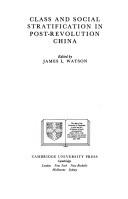
ISBN: 0521260620 Year: 1984 Publisher: Cambridge
Abstract | Keywords | Export | Availability | Bookmark
 Loading...
Loading...Choose an application
- Reference Manager
- EndNote
- RefWorks (Direct export to RefWorks)
Social stratification --- China --- S11/0534 --- S06/0261 --- Social classes --- -#SML: Joseph Spae --- Class distinction --- Classes, Social --- Rank --- Caste --- Estates (Social orders) --- Social status --- Class consciousness --- Classism --- China: Social sciences--Class studies --- China: Politics and government--Class conflict --- Congresses --- Congresses. --- #SML: Joseph Spae
Book
ISBN: 2070716503 9782070716500 Year: 1989 Publisher: Paris Gallimard
Abstract | Keywords | Export | Availability | Bookmark
 Loading...
Loading...Choose an application
- Reference Manager
- EndNote
- RefWorks (Direct export to RefWorks)
Journalists --- Press and politics --- Journalistes --- Presse et politique --- Biography --- Biographies --- Liu Binyan --- China --- Chine --- Politics and government --- Politique et gouvernement --- S11/0709 --- S06/0221 --- S06/0261 --- China: Social sciences--Cadres (incl. political commissars) --- China: Politics and government--People's Republic: central government --- China: Politics and government--Class conflict
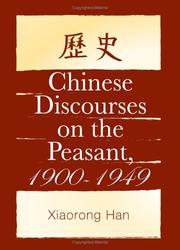
ISBN: 0791463192 0791483924 1423743695 9781423743699 9780791463192 9780791483923 Year: 2005 Publisher: Albany : State University of New York Press,
Abstract | Keywords | Export | Availability | Bookmark
 Loading...
Loading...Choose an application
- Reference Manager
- EndNote
- RefWorks (Direct export to RefWorks)
Xiaorong Han explores how Chinese intellectuals envisioned the peasantry and its role in changing society during the first half of the twentieth century. Politically motivated intellectuals, both Communist and non-Communist, believed that rural peasants and their villages would be at the heart of change during this long period of national crisis. Nevertheless, intellectuals saw themselves as the true shapers of change who would transform and use the peasantry. Han uses intellectuals' writings to provide a comprehensive look at their views of the peasantry. He shows how intellectuals with varying politics created images of the peasant—a supposed contemporary image and an ideal image of the peasant transformed for political ends, how intellectuals theorized on the nature of Chinese rural life, and how intellectuals conceived their own relationships with peasants.
S20/0250 --- S11/0481 --- S06/0255 --- S06/0261 --- China: Agriculture forestry, fishery, natural disasters--General works: since 1949 --- China: Social sciences--Rural life, rural studies: after 1949 --- China: Politics and government--Political theory: modern (and/or under Western influence) --- China: Politics and government--Class conflict --- HISTORY --- Modern / 20th Century --- Peasants --- Peasant uprisings --- Business & Economics --- Agricultural Economics
Book
ISBN: 0892640650 0892640669 0472127888 0472901842 9780472127887 9780472901845 Year: 1987 Publisher: Ann Arbor University of Michigan. Center for Chinese studies
Abstract | Keywords | Export | Availability | Bookmark
 Loading...
Loading...Choose an application
- Reference Manager
- EndNote
- RefWorks (Direct export to RefWorks)
Citizens and Groups in Contemporary China began with two symposia held in 1977 and 1978. The first, a workshop on “The Pursuit of Interest in China,” was held in August 1977 at the University of Michigan, and was organized by Michel Oksenberg and Richard Baum. It was supported by a grant from the Joint Committee on Contemporary China of the Social Science Research Council and the American Council of Learned Societies, using funds provided by the Andrew Mellon Foundation. Its principal goal was to use detailed case studies to explore the relevance of interest group approaches to the study of Chinese politics. The second, a panel organized by the editor for the 1978 Chicago meeting of the Association of Asian Studies, sought to apply participatory approaches to the role of social groups in the Chinese political process. The striking degree of overlap in the focus, methodology, and participants in both meetings suggested to a number of the paper writers that there was a need for a more eclectic approach which would focus simultaneously on individual and group actors. The recognition that a volume based on such an approach might serve the needs of students and scholars seeking to examine the dynamics of informal influence and power in China was the stimulus for publishing the studies presented here in book form.
Political participation --- Pressure groups --- S06/0261 --- S06/0500 --- Advocacy groups --- Interest groups --- Political interest groups --- Special interest groups (Pressure groups) --- Functional representation --- Political science --- Representative government and representation --- Lobbying --- Policy networks --- Political action committees --- Social control --- China: Politics and government--Class conflict --- China: Politics and government--Other modern political movements (e.g. anarchism, Socialism, dissident movements, Beijing Spring, Tian'anmen) --- China --- Politics and government
Book
ISBN: 9780804769044 9780804769037 0804769044 Year: 2010 Publisher: Stanford : Stanford University Press,
Abstract | Keywords | Export | Availability | Bookmark
 Loading...
Loading...Choose an application
- Reference Manager
- EndNote
- RefWorks (Direct export to RefWorks)
Authoritarianism --- China --- Politics and government --- Economic conditions --- S06/0224 --- S06/0261 --- S10/0251 --- China: Politics and government--People's Republic: central government: since 1976 --- China: Politics and government--Class conflict --- China: Economics, industry and commerce--General works and economic history: since 1989 --- Political science --- Authority --- Authoritarianism - China --- China - Politics and government - 1976-2002 --- China - Politics and government - 2002 --- -China - Economic conditions - 2000 --- -Authoritarianism --- Autoritarisme --- Secteur privé --- Chine --- Politique et gouvernement --- 1976-.... --- 1997-.... --- Conditions économiques --- 1976-2000 --- 2000-.... --- Secteur privé --- Conditions économiques
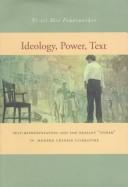
ISBN: 0804765197 9780804765190 0804733198 9780804733199 Year: 1998 Publisher: Stanford, Calif.
Abstract | Keywords | Export | Availability | Bookmark
 Loading...
Loading...Choose an application
- Reference Manager
- EndNote
- RefWorks (Direct export to RefWorks)
The division between the scholar-gentry class and the “people” was an enduring theme of the traditional Chinese agrarian-bureaucratic state. Twentieth-century elites recast this as a division between intellectuals and peasants and made the confrontation between the writing/intellectual self and the peasant “other” a central concern of literature. The author argues that, in the process, they created the “peasantry,” the downtrodden rural masses represented as proper objects of political action and shifting ideological agendas. Throughout this transition, language or discourse has been not only a weapon of struggle but the center of controversy and contention. Because of this primacy of language, the author’s main approach is the close reading or, rather, re-reading of significant narrative fictions from four literary generations to demonstrate how historical, ideological, and cultural issues are absorbed, articulated, and debated within the text. Three chapters each focus on one representative author. The fiction of Lu Xun (1881-1936), which initiated the literary preoccupation with the victimized peasant, is also about the identity crisis of the intellectual. Zhao Shuli (1906-1970), upheld by the Communist Party as a model “peasant writer,” tragically exemplifies in his career the inherent contradictions of such an assigned role. In the post-Mao era, Gao Xiaosheng (1928—) uses the ironic play of language to present a more ambiguous peasant while deflating intellectual pretensions. The chapter on the last of the four “generations” examines several texts by Mo Yan (1956—), Han Shaogong (1952—), and Wang Anyi (1954—) as examples of “root-searching” fiction from the mid-1980’s. While reaching back into the past, this fiction is paradoxically also experimental in technique: the encounter with the peasant leads to questions about the self-construction of the intellectual and the nature of narrative representation itself. Throughout, the focus is on texts in which some sort of representation or stand-in of the writer/intellectual self is present—as character, as witness, as center of consciousness, or as first-person or obtrusive narrator. Each story catches the writer in a self-reflective mode, the confrontation with the peasant “other” providing a theater for acting out varying dramas of identity, power, ideology, political engagement, and self-representation.
Chinese fiction --- Peasants in literature. --- Peasantry in literature --- History and criticism. --- Peasants in literature --- S02/0220 --- S06/0261 --- S06/0262 --- S15/0210 --- S16/0170 --- S16/0180 --- History and criticism --- China: General works--Intellectuals: after 1949 --- China: Politics and government--Class conflict --- China: Politics and government--Mass line, mass criticism --- China: Language--Special linguistic subjects --- China: Literature and theatrical art--General works on modern literature --- China: Literature and theatrical art--Stylistics
Book
ISBN: 0231051824 Year: 1981 Publisher: New York (N.Y.): Columbia university press
Abstract | Keywords | Export | Availability | Bookmark
 Loading...
Loading...Choose an application
- Reference Manager
- EndNote
- RefWorks (Direct export to RefWorks)
Social classes --- Social conflict --- Social structure --- Communism --- Classes sociales --- Conflits sociaux --- Structure sociale --- Communisme --- S06/0261 --- S11/0534 --- -Social classes --- -Social conflict --- #SML: Joseph Spae --- Organization, Social --- Social organization --- Anthropology --- Sociology --- Social institutions --- Class conflict --- Class struggle --- Conflict, Social --- Social tensions --- Interpersonal conflict --- Social psychology --- Class distinction --- Classes, Social --- Rank --- Caste --- Estates (Social orders) --- Social status --- Class consciousness --- Classism --- Social stratification --- Bolshevism --- Communist movements --- Leninism --- Maoism --- Marxism --- Trotskyism --- Collectivism --- Totalitarianism --- Post-communism --- Socialism --- Village communities --- China: Politics and government--Class conflict --- China: Social sciences--Class studies
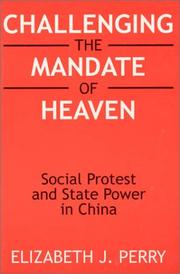
ISBN: 0765604442 0765604450 Year: 2002 Publisher: Armonk Sharpe
Abstract | Keywords | Export | Availability | Bookmark
 Loading...
Loading...Choose an application
- Reference Manager
- EndNote
- RefWorks (Direct export to RefWorks)
Protest movements --- Political culture --- Contestation --- Culture politique --- History --- Histoire --- Chine --- S11/0820 --- S11/0480 --- S11/0485 --- S06/0261 --- -Protest movements --- China: Social sciences--Labour conditions and trade unions: general and before 1949 --- China: Social sciences--Rural life, rural studies: general and before 1949 --- China: Social sciences--Rural change --- China: Politics and government--Class conflict --- -S06/0500 --- S06/0500 --- S11/0830 --- S11/0490 --- -Political culture --- Social movements --- Culture --- Political science --- China: Politics and government--Other modern political movements (e.g. anarchism, Socialism, dissident movements, Beijing Spring, Tian'anmen) --- China: Social sciences--Labour conditions and trade unions: since 1949 --- China: Social sciences--Society: general --- -History --- -History -
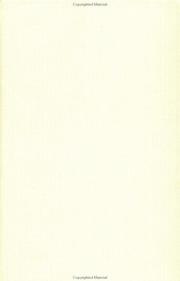
ISBN: 1280282150 9786610282159 0203018036 9780203018033 9780415934282 0415934281 6610282153 0415934281 9781135953003 1135953007 9781135952952 1135952957 9781135952990 113595299X 9780415653336 0415653339 Year: 2002 Publisher: New York Routledge
Abstract | Keywords | Export | Availability | Bookmark
 Loading...
Loading...Choose an application
- Reference Manager
- EndNote
- RefWorks (Direct export to RefWorks)
When Communist revolutionaries seized control of Mainland China in 1949, they faced enormous challenges of state and nation building. China occupied a vast territory, had a huge and poorly integrated population and suffered from a woefully backward economy. Building a Socialist Chinese state required effectivly managing significant opposition to the imposition of the Communist regime. This study examines the the Chinese Communist Party employed language as an essential part of its strategy to achieving these goals.
Propaganda, Communist --- Genocide --- Cleansing, Ethnic --- Ethnic cleansing --- Ethnic purification --- Ethnocide --- Purification, Ethnic --- Crime --- Zhongguo gong chan dang. --- Zhong guo gong chan dang --- Chung-kuo kung chʻan tang --- Chūgoku Kyōsantō --- Chungguk Kongsandang --- 中国共产党 --- 中國共產黨 --- КПК --- KPK --- Komunistická strana Číny --- Komunistička partija Kine --- Communist Party of China --- Chinese Communist Party --- Communist Party (China) --- Gong chan dang (China) --- 共产党 (China) --- Коммунистическая партия Китая --- Kommunisticheskai︠a︡ partii︠a︡ Kitai︠a︡ --- Shina Kyōsantō --- Китайска комунистическа партия --- Kitaĭska komunisticheska partii︠a︡ --- Partido Comunista de China --- PCCh --- Parti communiste chinois --- CCP --- Partito comunista cinese --- KPCh --- Kommunistische Partei Chinas --- К.П.К. --- K.P.K. --- CPC --- C.C.P. --- Partia Komuniste të Kinës --- Đảng cộng sản Trung quốc --- Zhong gong --- 中共 --- Pcc --- P.C. Chino --- ХКН --- KhKN --- Хятадын Коммунист нам --- Khi︠a︡tadyn Kommunist nam --- S06/0261 --- S06/0421 --- S06/0900 --- S06/1000 --- S06/1010 --- S11/0534 --- S11/0950 --- S11/1040 --- S15/0210 --- China: Politics and government--Class conflict --- China: Politics and government--CCP: 1949 - 1966 --- China: Politics and government--Political propaganda --- China: Politics and government--Political campaigns --- China: Politics and government--First communist campaigns --- China: Social sciences--Class studies --- China: Social sciences--Prisons and labour camps --- China: Social sciences--Population, demography: China: since 1949 --- China: Language--Special linguistic subjects
| Listing 1 - 9 of 9 |
Sort by
|

 Search
Search Feedback
Feedback About UniCat
About UniCat  Help
Help News
News